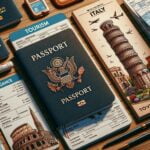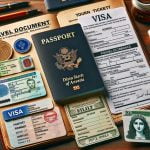Are you planning a trip to Italy and wondering what documents are needed for travel to Italy? Whether you’re going for a leisurely vacation, business trip, or study abroad program, it’s crucial to have all the necessary documentation in place before embarking on your journey.
From passport and visa requirements to travel insurance and health documents, there are several essential items you’ll need to organize before setting foot in the beautiful country of Italy. In this comprehensive guide, we’ll walk you through everything you need to know about the various documents required for traveling to Italy.
Italy is a popular tourist destination known for its rich history, stunning architecture, delectable cuisine, and breathtaking landscapes. Before immersing yourself in la dolce vita, it’s important to ensure that you have all the right paperwork in order. This includes having a valid passport, obtaining any necessary visas, securing travel insurance, and carrying essential health documents. Furthermore, if you plan on driving in Italy or staying in accommodations during your visit, there are additional documents that may be required.
In this guide, we’ll discuss the specific requirements for each type of document needed for travel to Italy. We will provide detailed information on passport and visa requirements, travel insurance and health documentation, driving permits, as well as important safety and security documents.
By understanding the necessary documentation upfront and preparing accordingly, you can ensure a smooth and stress-free experience during your trip to Italy. So let’s get started on unpacking the essential documents needed for your Italian adventure.
Passport Requirements for Travel to Italy
When planning a trip to Italy, one of the most important things to consider is ensuring that you have the necessary documents for traveling. One of the key documents needed for travel to Italy is a valid passport.
For citizens of the United States, a passport is required for entry into Italy, and it must be valid for at least three months beyond your planned date of departure from the Schengen area. It is essential to check the expiration date on your passport well in advance of your travel date and renew it if necessary, as Italian authorities are strict about this requirement.
In addition to having a valid passport, it is also crucial to ensure that you have enough blank pages in your passport for entry and exit stamps. The standard recommendation is to have at least two blank pages available in your passport book before any international travel. This allows room for any necessary visas or entry/exit stamps that may be required while traveling to Italy.
It’s important to note that while some countries may allow their citizens to enter Italy with just a national ID card, travelers from non-European Union countries such as the United States are required to have a passport for entry into Italy. Therefore, it’s essential to verify what documents are needed for travel to Italy based on your country of citizenship before planning your trip.
Visa Requirements for Travel to Italy
Italy is a popular destination for tourists from all over the world, with its rich history, beautiful landscapes, and delicious cuisine. If you are planning a trip to Italy, it is important to be aware of the visa requirements for your specific situation. Whether you are traveling for tourism, business, or study purposes, there are different visa requirements that you need to consider.
For citizens of the United States and many other countries, a visa is not required for stays in Italy that are less than 90 days. This means that if you are planning a short vacation or business trip to Italy, you generally do not need to apply for a visa before your trip. However, it is essential to check the specific visa requirements based on your nationality and travel purpose.
If you are planning to stay in Italy for longer than 90 days or if your travel purpose is different from tourism or business (such as studying or working), you will likely need to apply for a specific type of visa. It is important to research the visa requirements well in advance of your trip and submit your application with all the necessary documents.
| Required Documents | Details |
|---|---|
| Passport | A valid passport that does not expire within three months of your departure date from Italy. |
| Visa Application Form | For stays longer than 90 days or for specific travel purposes. |
| Proof of Travel Insurance | Evidence of travel insurance coverage for medical emergencies and repatriation. |
Travel Insurance and Health Documents Needed for Travel to Italy
When traveling to Italy, it is important to ensure that you have the necessary travel insurance and health documents in place. This is essential for your own peace of mind, as well as for any unexpected events or emergencies that may arise during your trip. Here’s what you need to know about travel insurance and health documents needed for travel to Italy.
First and foremost, it is highly recommended to have travel insurance when visiting Italy. While it may not be a mandatory requirement for entry into the country, having travel insurance can help protect you from unforeseen circumstances such as trip cancellations, medical emergencies, lost luggage, and other unexpected situations. Make sure to carefully review the coverage offered by different insurance policies to select one that best meets your needs.
In addition to travel insurance, it is also important to have the necessary health documents for your trip to Italy. This includes a valid passport, of course, but also any required vaccinations or health clearances.
For example, if you are traveling from a country with a risk of yellow fever transmission, you may need a yellow fever vaccination certificate to enter Italy. It’s always best to check with your healthcare provider or the Italian embassy in your country for specific health requirements before traveling.
It’s also important to note that Italy has a reciprocal healthcare agreement with many countries including those in the European Union. If you are an EU citizen, you can use your European Health Insurance Card (EHIC) when seeking medical treatment in Italy. However, it’s still advisable to have comprehensive travel insurance alongside this card. For non-EU citizens, it’s crucial to have adequate health insurance coverage for any medical treatment needed while in Italy.
| Document/Requirement | Description |
|---|---|
| Travel Insurance | Recommended for protection against trip cancellations, medical emergencies, lost luggage |
| Health Documents | Including valid passport and any required vaccinations or health clearances |
| European Health Insurance Card (EHIC) | For EU citizens seeking medical treatment in Italy |
Documents for Driving in Italy
When planning a trip to Italy, it’s important to consider the documents required for driving in the country. Whether you plan on renting a car or driving your own vehicle, there are specific documents that you’ll need to have with you at all times while on the road. Understanding these requirements will ensure a smooth and hassle-free experience as you explore the beautiful Italian countryside and bustling cities.
First and foremost, anyone driving in Italy must have a valid driver’s license from their home country. If your license is not printed in the Roman alphabet, it’s recommended to also carry an International Driving Permit (IDP) along with your regular license. The IDP serves as a translation of your license and can be extremely helpful in communicating with local authorities if necessary.
In addition to your driver’s license and IDP, it’s crucial to have the vehicle’s registration document (V5C) and insurance certificate. If you’re renting a car, make sure these documents are provided by the rental company.
If using your own vehicle, double-check that your insurance coverage includes international travel and consider purchasing additional coverage if needed. Being prepared with all required documentation will help avoid any complications in case of accidents or routine traffic stops during your travels in Italy.
Overall, being well-prepared with the necessary documents for driving in Italy is essential for a stress-free journey through this enchanting country. By ensuring you have your driver’s license, IDP (if applicable), vehicle registration, and insurance documentation readily available, you can focus on enjoying the scenery and cultural experiences without worry.
Documentation for Accommodation in Italy
When traveling to Italy, having the necessary documentation for accommodation is essential for a smooth and enjoyable trip. Whether you are staying in a hotel, Airbnb, or rental property, there are specific documents you should have ready for your stay in Italy.
First and foremost, it is important to have a copy of your reservation confirmation or booking confirmation. This will serve as proof of your accommodation arrangements and can also be helpful in case of any discrepancies upon arrival. It’s also a good idea to have the contact information for your accommodation readily available, including the address and phone number.
In addition to your booking confirmation, it is recommended to have a form of identification on hand when checking in to your accommodation. This can be either a passport or another form of government-issued ID. Some accommodations may require this as part of their check-in process, so it’s best to be prepared.
Lastly, if you are staying at an Airbnb or rental property, make sure you have all the necessary communication and agreement documentation with the host or owner. This may include emails or messages discussing rental details, house rules, and any other important information regarding the property.
To ensure a stress-free experience during your stay in Italy, it is crucial to have these documents readily available when checking into your accommodation.
- Reservation confirmation or booking confirmation
- Contact information for the accommodation (address and phone number)
- Form of identification (passport or government-issued ID)
- Communication and agreement documentation for Airbnb or rental property
Important Safety and Security Documents for Traveling to Italy
When traveling to Italy, it is important to ensure that you have all the necessary safety and security documents to have a smooth and worry-free trip. Here are the essential documents you need to prepare for your visit to Italy:
- Travel Insurance: It is highly recommended to have travel insurance when visiting Italy. This will provide coverage for unexpected incidents such as medical emergencies, trip cancellations, lost luggage, and more. Be sure to carry a copy of your travel insurance policy and contact information with you at all times during your trip.
- Emergency Contact Information: Before your trip, make sure to compile a list of important emergency contact numbers including local authorities, your country’s embassy or consulate in Italy, and your family or friends back home. Keep this list easily accessible in case of any unforeseen circumstances.
- Copy of Passport and Visa: It is wise to carry photocopies of your passport and visa with you at all times while exploring Italy. Store them separately from the originals in case they get lost or stolen
In addition to these documents, it is also important to stay informed about the current safety and security situation in Italy. Check travel advisories from your government’s official website before departure and stay updated throughout your visit.
Ensure that you have taken all necessary precautions and have prepared all required documents for a safe and enjoyable trip to Italy. By being well-prepared with these safety and security documents, you can relax and enjoy everything that Italy has to offer without unnecessary stress or worry around unforeseen events.
Additional Necessary Documents for Travel to Italy
When planning a trip to Italy, it’s important to make sure you have all the necessary documents in order to ensure a smooth and hassle-free journey. In addition to your passport, visa, travel insurance, and health documents, there are a few additional documents that you may need to have on hand during your travels.
Proof of Accommodation
One of the additional documents you will need for your trip to Italy is proof of accommodation. This could be in the form of hotel reservations, Airbnb bookings, or a letter of invitation if you are staying with friends or family. Italian authorities may ask for this information upon entry into the country, so it’s important to have it readily available.
Proof of Sufficient Funds
When entering Italy, you may be asked to provide proof that you have enough money to support yourself during your stay. This could be in the form of bank statements, credit card statements, or traveler’s checks. Make sure you have these documents easily accessible in case they are requested by customs officials.
Transportation Tickets
If you plan on traveling within Italy using public transportation or are renting a car, it’s essential to have documentation for your travel arrangements. This could include train or bus tickets, rental car agreements, or confirmation emails for any pre-booked transportation services. Having these documents on hand will help avoid any potential issues during your travels.
By ensuring that you have all these additional necessary documents in place before traveling to Italy, you can minimize any potential complications and focus on enjoying your trip. It’s always best to double-check the specific requirements and recommendations from the Italian embassy or consulate in your home country before making final preparations for your travels.
Conclusion and Recap of Required Documents for Travel to Italy
In conclusion, traveling to Italy requires several essential documents to ensure a smooth and enjoyable trip. One of the most important documents needed for travel to Italy is a valid passport. It is crucial to ensure that your passport is valid for at least six months beyond your planned date of departure. Additionally, travelers from certain countries may also need to obtain a visa before entering Italy, so it is important to check the specific requirements based on your nationality.
Moreover, it is highly recommended to have travel insurance and necessary health documents when visiting Italy. This includes obtaining the European Health Insurance Card (EHIC) which provides access to state-provided healthcare during a temporary stay in another European Economic Area (EEA) country or Switzerland. Furthermore, if you plan on driving in Italy, you will need an International Driving Permit (IDP) in addition to your driver’s license.
When it comes to accommodation, having documentation of your hotel reservations or rental arrangements is essential for entry into Italy. It is also advisable to have important safety and security documents such as emergency contact information, copies of important travel documents, and knowledge of local laws and customs.
In summary, ensuring that all these required documents are in order will help facilitate a seamless and hassle-free experience while traveling to Italy. By having the necessary paperwork organized and readily available, travelers can focus on enjoying everything that this beautiful Mediterranean country has to offer.
Frequently Asked Questions
What Documents Do I Need to Enter Italy?
To enter Italy, you will generally need a valid passport that is not set to expire within three months of your departure from the Schengen area. If you are staying for more than 90 days, you may also need a visa.
Do I Need Proof of Funds to Travel to Italy?
It is advisable to have proof of sufficient funds to cover your stay in Italy, although it may not always be required for entry. Having proof of funds can help show border officials that you can financially support yourself while in the country.
Do You Need Etias to Travel to Italy?
Starting in 2022, travelers from visa-exempt third countries will be required to obtain an ETIAS (European Travel Information and Authorization System) prior to entering Italy or any other Schengen area country. The ETIAS is a simple online process that screens travelers before their arrival in Europe.

I’m a passionate traveler, writer, and Italophile. My fascination with Italy’s history, art, and culture has led me on countless adventures across the Italian landscape. Through “I Live Italy,” I share my love for this extraordinary country and aims to inspire others to explore its boundless beauty.





